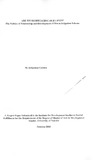| dc.description.abstract | This study is about the politics of trusteeship in local development. As a concept,
trusteeship means the intent expressed by one source ofagency to develop the capacity of
another. On account of trusteeship, one agency is entrusted with acting on behalf of
another to try to ensure development of the other. However, these interventions
sometimes result into serving the economic interests of the agency itself, rather than
delivering development for the benefit of the targeted community. Relatedly,
beneficiaries begin to view the development initiatives by the agency as uncalled for and
carrying with them a hidden agenda - to exploit and oppress them. As a result, the
development project by the trustee fails to be sustained because of failing to meet the
local peoples' expectations. This study looks at the legitimacy of the trustee and the
reasons why development agencies have the intent of developing other actors. The main
research question guiding this study is why do development agencies have the intent of
developing other actors? Consequently, whose interests do development agencies
represent and to what extent do they involve the beneficiaries in their development
projects?
The study was carried out in Mwea Irrigation Scheme in Kirinyaga District. The data for
this study was collected during the month of June and July 2003. Data collection was
carried out using structured and unstructured questionnaires. 100 respondents were
interviewed by use of the structured questionnaires. The unstructured questionnaires, on
the other hand, were administered to ten key informants who included: three National
Irrigation Board official in Mwea, two officials ofthe Mwea Rice Growers Multipurpose
Co-operative, the Chairman of Mwea Rice Farmers SACCO Bank, Chairman of Mwea
Rice Growers Multipurpose Co-operative Society, a local councilor, and two former
members of the National Irrigation Board Advisory Committee in Mwea. The data was
analyzed using both qualitative and quantitative methods. Quantitative analysis involved
calculation of frequency distributions and cross tabulations while qualitative analysis
involved content analysis of the emerging relations, themes and patterns of trusteeship
and local development in relation to the hypothesized variables.
The findings show that the failure of the trustee to involve the beneficiaries in their
development initiatives leads to the later distancing themselves from the activities of the
former. The local community begin to view the trustee as the beneficiary of its initiatives
and serving the interests of its own and that of its master. The relationship between the
two then becomes increasingly troubled as the beneficiaries develop negative perception
towards the trustee. As a result, the development initiatives by a trustee fail to be
sustainable.
By not encouraging popular participation in local development, the beneficiaries begin to
show dissatisfaction with development initiatives by the trustee as they withdraw their
popular support from it. Trustees need to legitimize their development activities at the
local level through encouraging popular participation. This is the only way that can make
their development initiatives sustainable as the beneficiaries continue to own their
projects and to associate themselves with their development activities. The future of
trusteeship therefore lies in a situation where the trustee and the beneficiaries sit and
discuss on the way forward and the necessary interventions to be made. The trustee must
engage itselfin the promotion and protection of the interests of the local community, as
this will ensure the beneficiaries' support for its development initiatives . | en |

